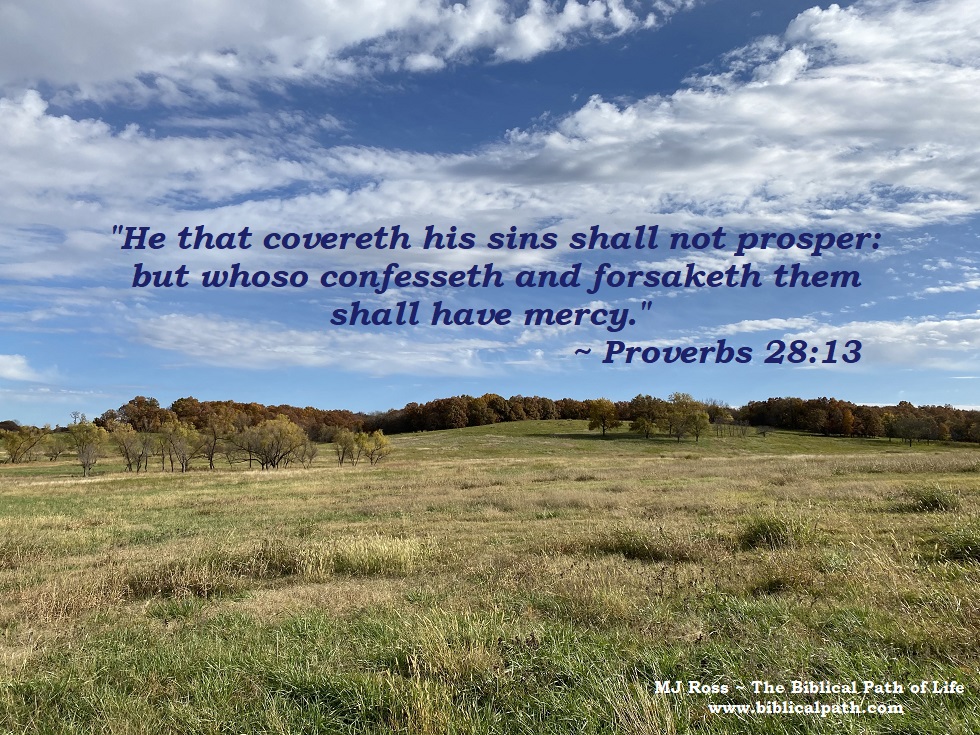
“He that covereth his sins shall not prosper: but whoso confesseth and forsaketh them shall have mercy.“
Proverbs 28:13
In most people’s eyes, King David was a much bigger sinner than King Saul was. Saul chose to disobey God’s Word. David took another man’s wife and ordered the death of her husband in battle – premeditated murder. That sounds much worse to most people. However, according to God’s Word, both men were sinners before a Holy God. “2. God looked down from heaven upon the children of men, to see if there were any that did understand, that did seek God. 3. Every one of them is gone back: they are altogether become filthy; there is none that doeth good, no, not one” (Psalm 53:2-3). The penalty has not changed from the Old Testament to the New Testament. “For the wages of sin is death …” (Romans 6:23a).
Why then was David considered the best king that Israel ever had when he was such a sinner? He understood the way a sinner must come before a Holy God; in true repentance.
Remember when King Saul was confronted with his sin by Samuel. “Wherefore then didst thou not obey the voice of the LORD, but didst fly upon the spoil, and didst evil in the sight of the LORD?” (1 Samuel 15:19). What was Saul’s reply? “20. And Saul said unto Samuel, Yea, I have obeyed the voice of the LORD, and have gone the way which the LORD sent me … 21. But the people took of the spoil, sheep and oxen, the chief of the things which should have been utterly destroyed, to sacrifice unto the LORD thy God in Gilgal” (1 Samuel 15:20-21). Notice he did not admit his sin. Instead, he justified his sin with his own words. Samuel reminded Saul what God requires, not what man thinks God requires. “22. And Samuel said, Hath the LORD as great delight in burnt offerings and sacrifices, as in obeying the voice of the LORD? Behold, to obey is better than sacrifice, and to hearken than the fat of rams. 23. For rebellion is as the sin of witchcraft, and stubbornness is as iniquity and idolatry. Because thou hast rejected the word of the LORD, he hath also rejected thee from being king” (1 Samuel 15:22-23). Saul thought God expected a sacrifice. Samuel declared God required obedience to His Word, not rebellion. Saul stubbornly fulfilled his own will, not God’s. When Samuel declared God rejected Saul from being king, Saul admitted he had sinned. Nevertheless, Saul still refused to submit to God and repent. Instead, he asked Samuel to “keep up appearances.” “Then he said, I have sinned: yet honour me now, I pray thee, before the elders of my people, and before Israel, and turn again with me, that I may worship the LORD thy God” (1 Samuel 15:30). Saul declared he would worship “the LORD thy God.” Saul revealed his attitude toward God.
Recall what Samuel told King Saul, even before his kinship ended. “But now thy kingdom shall not continue: the LORD hath sought him a man after his own heart, and the LORD hath commanded him to be captain over his people, because thou hast not kept that which the LORD commanded thee” (1 Samuel 13:14). God had chosen a young shepherd named David. Before Samuel anointed David, God told him “… for the LORD seeth not as man seeth; for man looketh on the outward appearance, but the LORD looketh on the heart” (1 Samuel 16:7b).
After David’s “great” sin, Nathan the prophet came to him and confronted him with, “Thou art the man” (see 2 Samuel 12:7). Immediately, “And David said unto Nathan, I have sinned against the LORD. And Nathan said unto David, The LORD also hath put away thy sin; thou shalt not die” (2 Samuel 12:13). When David was rebuked because of sin, he immediatly repented. Psalm 51 is a heartfelt prayer from David’s heart revealing this repentance. “2. Wash me throughly from mine iniquity, and cleanse me from my sin. 3. For I acknowledge my transgressions: and my sin is ever before me. 4. Against thee, thee only, have I sinned, and done this evil in thy sight …” (Psalm 51:2-4a). David understood what God expected. “16. For thou desirest not sacrifice; else would I give it: thou delightest not in burnt offering. 17. The sacrifices of God are a broken spirit: a broken and a contrite heart, O God, thou wilt not despise” (Psalm 51:16-17). David recognized that God sees the heart.
In light of these things, David was the greatest king that Israel had, not because he was sinless, but because he understood how a sinful man must approach a Holy God – with complete repentance and a change of heart. He wanted his heart cleansed. “Create in me a clean heart, O God; and renew a right spirit within me” (Psalm 51:10).
One can clearly see through King Saul and King David the following verse revealed: “He that covereth his sins shall not prosper: but whoso confesseth and forsaketh them shall have mercy” (Proverbs 28:13).
Are you like King Saul who covered his sin and did not prosper?
Or,
Are you like King David who forsook his sin, and God showed mercy upon him?